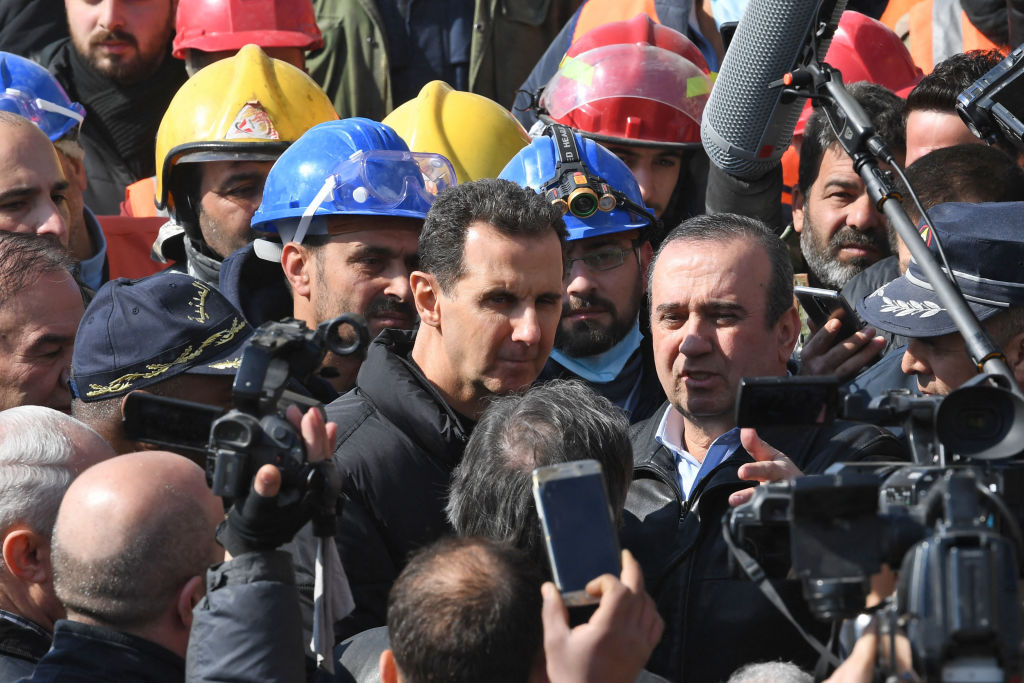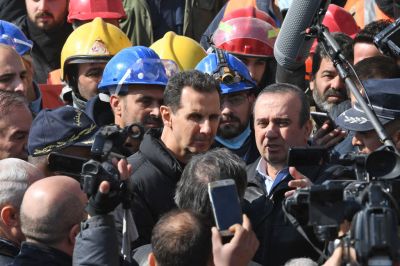After more than a decade of destructive civil war, the Syrian people are now reeling from massive earthquakes. Yet Syrian President Bashar al-Assad sees an opportunity: While this month’s earthquakes killed at least 41,000 people in Syria and Turkey and left many more homeless, Assad has used the disaster to try to legitimize his contested rule.
Last week, the United States Treasury announced a six-month freeze on sanctions against the Syrian government involving “all transactions related to earthquake relief.” Though U.S. officials insisted none of their existing penalties on Damascus targeted humanitarian aid shipments, the move followed finger-pointing from regime officials who wasted no time in blaming Western sanctions for their own deficient response to the catastrophe.
“I want to make very clear that U.S. sanctions in Syria will not stand in the way of life-saving efforts for the Syrian people,” Deputy Secretary of the Treasury Wally Adeyemo said in announcing the temporary measure. “While U.S. sanctions programs already contain robust exemptions for humanitarian efforts, today Treasury is issuing a blanket General License to authorize earthquake relief efforts so that those providing assistance can focus on what’s needed most: saving lives and rebuilding.”
While his government complained about sanctions, the dictator of more than two decades has been stalling the delivery of life-saving relief for political gain. Until last week, the regime had insisted that all international assistance be routed through the Damascus government, delaying aid shipments to some of the hardest-hit areas in the country's rebel-held northwest.
On Tuesday, the United Nations brokered a deal with Assad to open two new border crossings for aid to enter opposition-controlled territory by way of Turkey. But critics say the UN-brokered agreement gives Assad’s unpopular regime badly needed political capital, as well as the appearance of dominion over opposition-controlled regions.
U.S. officials have also expressed concern about Assad’s compliance with the UN deal. “We’re not completely confident that Mr. Assad is going to abide by that [deal], that he might act in capricious ways here,” National Security Council spokesman John Kirby told reporters Thursday. “We have, I think, good reason to suspect that.”
U.S. Ambassador to the UN Linda Thomas-Greenfield this week introduced a resolution to codify the deal at the UN Security Council, where Assad-aligned Russia regularly vetoes the creation of UN-run aid operations into opposition-held Syria. But it’s unclear whether the effort will have the votes, and time to secure a reliable flow of humanitarian aid is running out.
After visiting some of the stricken areas of Turkey and Syria, UN aid chief Martin Griffiths declared on Tuesday that the region was facing “a crisis of colossal proportions.” Nearly nine million people have been affected by the earthquakes in Syria alone, the UN Office for the Coordination of Humanitarian Affairs estimated, with most of them in parts of the country that have been ravaged by more than a decade of civil war. The ongoing conflict, in addition to weakening the region’s infrastructure and exacerbating the death toll, makes delivering aid that much more difficult.
A Syrian refugee from the war-torn city of Aleppo and program officer at the Turkey-based Önder Organization—which has been providing field support to earthquake victims in Syria and Turkey—said the patchwork of different territorial holdings in northern Syria resembles Game of Thrones. He added that the Assad regime has a history of actively targeting non-profits like his as they distribute aid to opposition-held areas. (The refugee, who is not a Turkish citizen, asked not to be identified for fear of retribution.)
The U.S. committed $85 million in disaster relief to address the unfolding disaster last week, but Washington—which severed all remaining ties to Damascus in 2012 amid the Syrian civil war—and many other international backers avoid channeling aid through the government for fear of enriching the repressive Assad regime.
Still, some countries have apparently softened on assisting the Assad regime in the wake of the disaster. Saudi Arabia this week delivered its first aid shipment to government-held territory in Syria since the war broke out. Several other Middle Eastern and Asian countries have started sending support by way of Damascus as well. “The Syrian people welcome and respond to any positive stance towards them, especially from the Arab brothers,” Assad said this week.
But it’s unclear whether many Syrians in areas outside government control will ever see this desperately needed relief.
“Here we have electricity. We have water,” said Mahmut Alchehadi, CEO of the Gaziantep-based Orange Organization, after crossing the border into non-regime Syria a few days after the earthquakes first struck. “But, in Syria, they don’t have electricity. They don’t have water. They don’t have anything.”







Please note that we at The Dispatch hold ourselves, our work, and our commenters to a higher standard than other places on the internet. We welcome comments that foster genuine debate or discussion—including comments critical of us or our work—but responses that include ad hominem attacks on fellow Dispatch members or are intended to stoke fear and anger may be moderated.
With your membership, you only have the ability to comment on The Morning Dispatch articles. Consider upgrading to join the conversation everywhere.